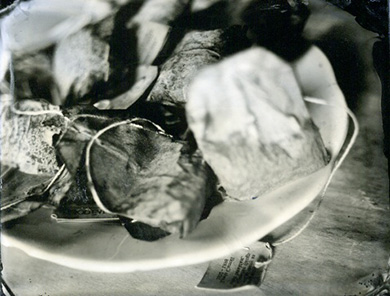


As in you sound like a broken record because you keep repeating yourself—like a broken record—and it’s disruptive; as in you’re unaware of how you keep repeating yourself like a broken record and I have to do something, so I’m drawing an analogy by saying you sound like a broken record; as in I’m saying you sound like a broken record so we can get back on track, the verbal equivalent of moving the needle forward on an actual broken record.
A repetitive person and a broken record are similar, except in this: no matter how quickly the needle is reset on a broken record, it’s impossible to do it before the looped snippet of music transforms into sound byte and the lyrics dissolve into abstraction. The same effect occurs when any word or phrase is repeated over and over enough times, like a broken record: it’s reduced to breath moving over vocal chords that mouths shape into sounds that signify nothing but themselves.
Like a broken mp3. No one will ever say that. Like a broken mp3 doesn’t relate to a person anywhere in its comparison: there’s no need for a body to reset a needle and no space for a voice to repeat itself like a broken record. A person could never physically sound like a broken mp3, anyway. A scratch in an mp3 turns a song into a digitized caterwaul that’s followed by vacuous silence. Telling a person they sound like a broken mp3 wouldn’t be as playful as saying they sound like a broken record; it would be an affront to their very humanness.
Mp3’s are also inhuman in their intolerance for accidents. The only skip, scratch or loop heard on an mp3 is an orchestrated feature. Like the splattered paint on an abstract expressionist’s canvas, flaws and repetitions are now a part of craft, an intentional pastiche of previously unplanned imperfections. Free of accidents, a broken mp3 won’t make music and language strange in pleasantly surprising ways. It eradicates rather than transforms; it sends a listener scrambling to squelch the sinister sounds by frantically pressing space bars and ergonomic buttons or uprooting auxiliary cords like weeds in a garden. There is no setting the needle back on the right track with a broken mp3—there is no needle and there is no track, unlike a broken record.
Semantically, a broken mp3 is actually broken, while the broken record referred to in the analogy isn’t. If it were broken, it wouldn’t play at all—like a broken mp3. You could argue that any deviation from the uninterrupted flow of a record defines it as broken. But there’s no debating that a broken mp3 is more broken than a broken record, because with a broken record, it’s still a circular whole that can spin and make sound in spite of its flaw and our preference for that sound. A broken record would never complete more than one revolution—it would abruptly cut off, like a broken mp3. With a broken record, the word broken means something beyond its definition.
And maybe it has always been understood that sounding like a broken record is an imprecise description, and nobody took the time to reset the needle on the analogy, like a scratched record, because its implied meaning transcends literal accuracy. Maybe the record never was and never will be broken; it just keeps spinning and spinning like always, its use renewed in its repetition—its poetry—like a broken record.

